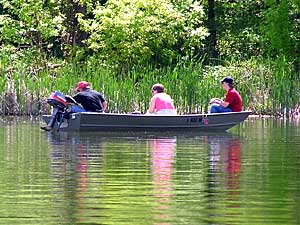|
Audio
Photos
Resources
Your Voice
|
Lakeshore development: How much is too much?
June 30, 2004
 |
| This shoreline would be a busy marina if the Blue Heron Bay development is constructed. (MPR photo/Dan Gunderson) |
Richville, Minn. — Dead Lake has more than 30 miles of shoreline. Many of the tree-covered hills around the lake are inhabited only by wildlife and cows. That will change if a Minneapolis developer prevails.
The Blue Heron Bay project would bring a small city to the shores of this Ottertail County lake 45 minutes east of Detroit Lakes.
The plan is to build 138 new housing units, a combination of single family homes, duplexes and cabins. There are also plans for a store, gas station, community center and marina. Blue Heron Bay would have its own sewer system.
Local residents say the proposed development would nearly double the population around Dead Lake. That would also mean twice as much boat traffic.
Area residents say the lake can't support such a large development. They say there's a reason much of the Dead Lake shoreline has never been developed. As Don Fondrick steers his pontoon slowly across Blue Heron Bay, he points to his depth finder. It shows the water in the bay is less than 5 feet deep. Dead Lake is big, nearly 8,000 acres. But it's also shallow. Much of the lake is less than 10 feet deep.
 | |||
Lake resident Don Fondrick believes a big development like Blue Heron Bay will increase nutrients in the water, choking the shallow lake with vegetation, and degrading water quality.
The Ottertail County Commission approved the project without an environmental impact study. County officials say the county shoreland zoning ordinance has been approved by the the state, and they believe Blue Heron Bay is covered by the existing zoning regulations.
The Dead Lake Property Owners Association sued the county commission and the developer. There are now three lawsuits aimed at stopping the development.
|
I think what the real issue is, is maybe the rules don't adequately cover this type of situation.
- Attorny Tami Norgard |
All three essentially seek the same result. Stop the project and force it to undergo more environmental scrutiny.
In the tiny town of Richville, a few miles from Dead Lake, the Lake Association hosts regular fundraisers to help pay for their legal fight.
Gary Ruehmann, wearing a bright red apron, takes a break from flipping pancakes. He's convinced the Blue Heron Bay Development must be stopped.
"What we see with this development in its present plan is it's just exploitation of an area to make some quick money and get out of there before any of the damage comes," says Ruehmann.
Dead Lake residents say they're not opposed to any new development on the lake as long as it can withstand the scrutiny of an environmental impact study.
Minneapolis attorney Jim Erickson, lead developer for Blue Heron Bay, scoffs at the idea his development would damage Dead Lake.
"Clearly that's a typical tactic of opponents. People who think it's their lake and want no more neighbors on their lake use the argument more study is needed," says Erickson.
Erickson says he's played by the rules. The County Commission approved his plan. A district court judge and the Minnesota Court of Appeals affirmed the decision.
 | |||
"We're on the side of lake protection," says Erickson. "But there are also property rights involved. We have property rights. Every individual has property rights whether it be a one cabin owner or someone who owns 250 acres with five miles of shoreline. If you follow the rules, your property rights should permit you to do what you want to do."
Finding a balance between property rights and environmental preservation is left to the Ottertail County Commission.
"They're kind of stuck between the proverbial rock and a hard spot with respect to projects such as this," says Michael Rengel.
The Fergus Falls attorney represents the county in the litigation over Blue Heron Bay development. Because of the pending litigation, he speaks for county officials.
"The county is very aware of it's resources and wishes to protect them," says Rengel. "But the county and their representatives feel very strongly that their ordinance complies with state law and that they followed the ordinance and the state law."
Ottertail County zoning regulations allow for cluster development. Experts say in many cases a cluster development is more environmentally responsible. A grouping of cabins or condos away from the shore has less impact than an equal number of individual lake cabins.
But a county official says when they established a cluster zoning provision, no one was thinking of developments as large as the 138-unit Blue Heron Bay project.
Attorney Tami Norgard says the size of this development is a key issue. Norgard represents the Minnesota Center for Environmental Advocacy, which is suing to stop the Blue Heron Bay project under the Minnesota Environmental Rights Act.
The law provides that civil action can be taken to protect air, water, land, or other natural resources from pollution, according to Norgard. She thinks Blue Heron Bay is a classic example of a growing problem in Minnesota.
"What you hear is the developer saying, 'We're playing by the rules.' I think what the real issue is, is maybe the rules don't adequately cover this type of situation. When you're putting a small city on a shallow bay, that wasn't contemplated by the cluster ordinance," says Norgard.
The Ottertail County Commission recently imposed a one-year moratorium on new cluster developments. The commission will review its zoning ordinances.
It will be months before litigation over Blue Heron Bay is resolved. The outcome could affect future development on environmentally sensitive lakes across Minnesota.
|
News Headlines
|
Related Subjects
|
